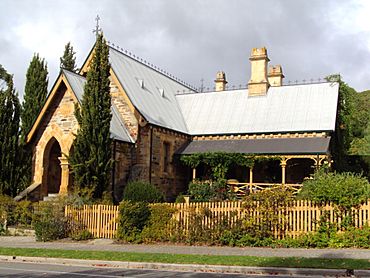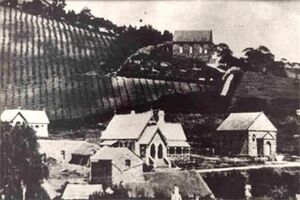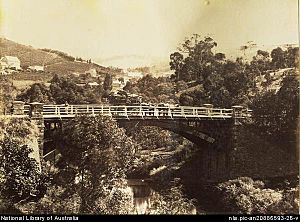Clarendon, South Australia facts for kids
Quick facts for kids ClarendonSouth Australia |
|||||||||||||||
|---|---|---|---|---|---|---|---|---|---|---|---|---|---|---|---|

Clarendon Police Station and Court House (built 1868)
|
|||||||||||||||
| Established | 1840 | ||||||||||||||
| Postcode(s) | 5157 | ||||||||||||||
| Elevation | 188 m (617 ft) | ||||||||||||||
| Location | 35.5 km (22 mi) from Adelaide | ||||||||||||||
| LGA(s) | City of Onkaparinga | ||||||||||||||
| Region | Southern Adelaide | ||||||||||||||
| County | Adelaide | ||||||||||||||
| State electorate(s) | Heysen | ||||||||||||||
| Federal Division(s) | Mayo | ||||||||||||||
|
|||||||||||||||
Clarendon is a small town in the Adelaide Hills. It is about 25 to 30 kilometers (15 to 19 miles) south of the Adelaide city centre. Today, it is seen as an outer suburb of Adelaide. The town is located within the City of Onkaparinga council area. You can find the Clarendon Weir in the town, right on the Onkaparinga River.
History of Clarendon
The Kaurna people were the first people to live in this area.
On October 21, 1840, a man named Richard Blundell was given the land title for this area. This happened after the land had been properly measured.
In 1846, James Philcox bought part of this land. He then divided it into smaller pieces and sold them. This is how the town of Clarendon was created. In 1848, the rest of the land was sold to Philcox's friend, George Morphett. He also measured and sold more land plots. Other people also added their land next to the growing town.
In December 1846, the Clarendon vineyards began. These were on land bought by William Augustine Leigh, a kind person from England. A vineyard was ready by 1849. Edward John Peake later bought the winery from Leigh. He built the first small house on the site. Then, he sold it to Joseph Gillard, who owned it for 40 years. Gillard sold most of his wine to Penfolds, a famous winery. In the 1970s, the old winery buildings were turned into a place for meetings and events.
By 1866, Clarendon was an important local center. It was known for its good farming land. Farmers grew a lot of wheat, peas, and potatoes there. In the early years, the Clarendon area, Coromandel Valley, and Kangarilla focused on fruit farms (orchards), vegetable gardens, and cutting timber. After the 1860s, new farming methods were used. Vineyards were planted in Clarendon and other areas. Many wineries started making and selling wine.
Early trade in Clarendon was based on its vineyards and its closeness to the Onkaparinga River. From 1894 to 1896, the Clarendon Weir was built. This helped the local economy even more.
Historic Buildings
Many old buildings in Clarendon are protected because they are important to history. They have been fixed up over time. These include the Gothic Court House and Police Station. Other protected buildings are the Bible Christian Methodist Church, the 1875 Methodist Church (now called Uniting Church), the Oddfellows Hall, and the General Store.
 | Jewel Prestage |
 | Ella Baker |
 | Fannie Lou Hamer |





